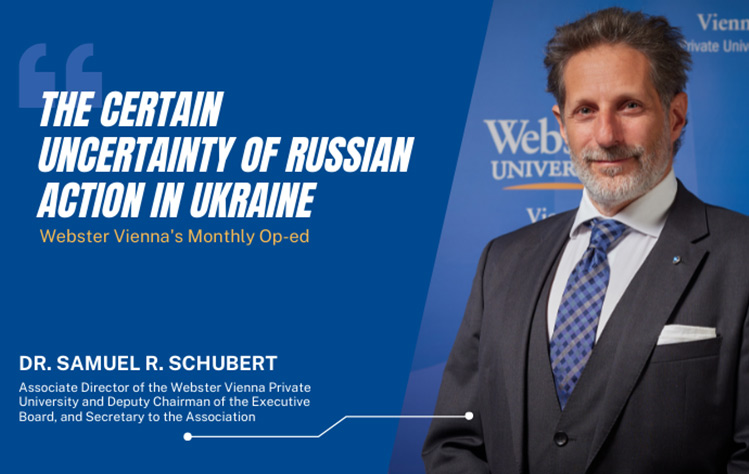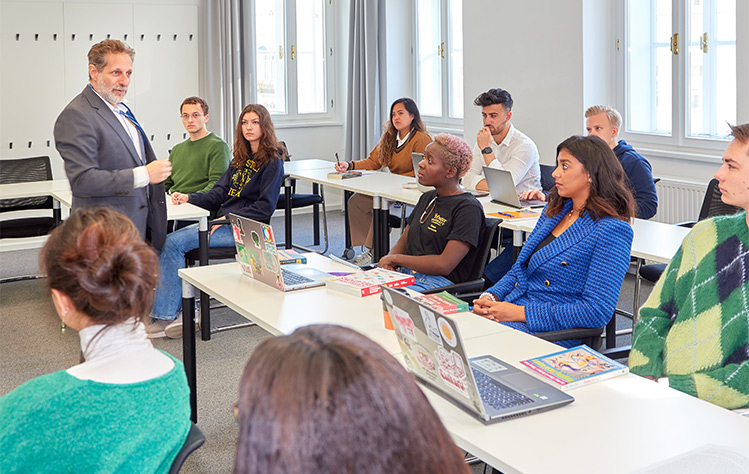Faculty Op-ed: The Certain Uncertainty of Russian Action in Ukraine
December 21, 2021
Dr. Samuel R. Schubert, associate director of Webster Vienna Private University and Deputy Chairman of the Executive Board, and Secretary to the Association, shared his views on the certain uncertainty of Russian action in Ukraine. Schubert's current research focuses on the nexus of energy policy and security at the European policy and geopolitical levels and the related foreign policies of great powers. He has (co)authored monographs on EU Energy Policy and articles and chapters on the resource curse, the role of energy in EU-Russia relations, economic and military developments in the Arctic, and lessons learned concerning strategic autonomy projects.

The Certain Uncertainty of Russian Action in Ukraine
S. R. Schubert
Russia is sending signals that it is planning to invade Ukraine. No doubt, there is sufficient cause for concern. Russia has built up a large military force along Ukraine’s border, enhanced rhetoric about Ukrainians and Russians being one people, and seems to be seeking skirmishes on land and sea, no matter how small, as proof that Kyiv, not Moscow is the provocateur. Add to that comments recently made by Russian President Vladimir Putin that he regretted the 1991 fall of the Soviet Union calling it “the greatest geopolitical disaster of the 20th century” and “a disintegration of historical Russia” - one that forced him to moonlight as a bombila or informal taxi driver - and we have the makings of what looks like a motive for a reconquering a key piece of a fabled lost empire. Yet an invasion is at this point by no means a certainty; and that is precisely what Russian President Vladimir Putin wants.
The current crisis is the latest in an ongoing struggle of narratives and pipedreams in which Moscow or more specifically Vladimir Putin is desperate to prevent Ukraine from moving closer to the West, strengthen its bonds with the EU, and serve as a US and NATO outpost too close for comfort to the Motherland. Meanwhile, Ukraine, which has endured two revolutions and six presidents since Mr. Putin came to power, has made slow but significant progress in its march toward democracy and is showing signs of developing a public willingness to resist repression from wherever it may come. Many Ukrainians reject the notion that they are one people with Russia and after years of fighting Russian separatists are not ready to rollover without a fight. They dream of joining the EU one day and some even believe that their partnership with NATO will protect them. Both narratives are sincere. Both visions for the future are pipedreams.
Russia will not be able to reel Ukraine back into its fold. The two countries have grown apart and Ukrainians, who have tasted the freedom and spirit of inching westward are not going to give in or give up so easily. Nor will Moscow be able to easily hold on to Ukraine or large parts of it if it indeed attacks. No doubt, Russia will win in the event of an invasion. But the victory will come at a high cost, if not immediately for Mr. Putin, most definitely for Russia and its citizens. Outgunned and outmanned Ukrainian forces would have to revert to a sustainable path of low-level resistance, perhaps even supported by US weapons, leading to Russian casualties that the Kremlin would find hard to justify at home. Moreover, it will be particularly difficult to justify the massacre of Ukrainian civilians who, according to the Kremlin’s prevailing narrative, are the same people as Russians.
 Still, Russia seems poised to do something as a last-ditch effort to get anything.
While the West (Europe and the US predominantly) speaks of international law, the
sovereignty of borders, and the principles of good ‘ol norms, Moscow is concerned
about pride and the need to right what it sees as an historic wrong.
Still, Russia seems poised to do something as a last-ditch effort to get anything.
While the West (Europe and the US predominantly) speaks of international law, the
sovereignty of borders, and the principles of good ‘ol norms, Moscow is concerned
about pride and the need to right what it sees as an historic wrong.
Russian political scientist Gleb Pavlovsky recently described Putin’s views of Ukraine as a “trauma wrapped in a trauma“ and he has a point. Ukraine has always been important to Russia, and to those who share the pathos of Russian literature and history was important to Russia even before there was a Russia when medieval Kyivan Rus ruled the space between the White and Black Seas. Therefore, Putin looks like he needs to get something, anything really. Add to that the perception that the US is in retreat as a global player, if not gun shy – a notion substantiated by two unsuccessful occupations, questions about the stability of its political system, and what appears to be a lack of enthusiasm at home for another foreign adventure – and we have the ingredients for miscalculation and folly.
Unfortunately for the Kremlin, a commitment from the West to integrate Ukraine no further is unlikely and a treaty is not on the table. The US and EU appear united in their position that there will be severe consequences for Russia if it does attack. In other words, measures designed to raise the cost of action for Moscow. Among these are a reversal on lifting the sanctions against the Nord Stream II project, providing specific weapons systems to Kyiv, and, more seriously, restricting Russia’s access to SWIFT, the international the global financial settlement system. If such measures are taken, they will have to be implemented swiftly and sustained as Russia has a $620 billion war chest in foreign reserves ready to weather the storm. Whether these threats hold to be true or not and whether they are enough to deter Moscow, we can be certain of only one thing: Ukraine will always be more important to Russia than it will for the US or EU.
Dr. Schubert teaches Graduate and Undergraduate Seminars on Terrorism and Political Violence, International Relations Theory, International Security/Energy Security, U.S. Foreign Policy and U.S. National Institutions, Middle East Area Studies, and Comparative Foreign Policy. Are you interested in the studying International Relations in Austria? Contact Webster Vienna Private University to get started.
